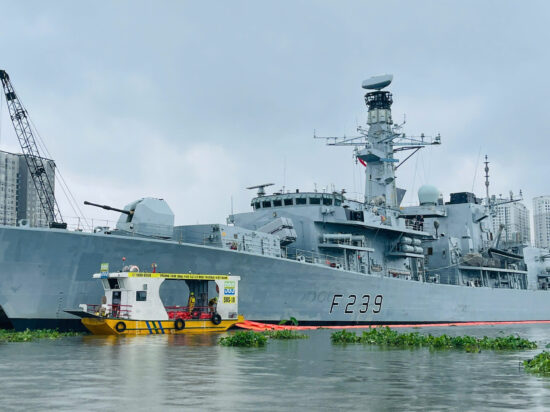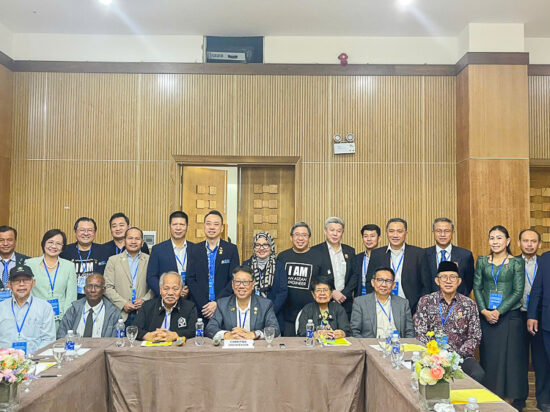More and more oil and chemical exploitation, processing, transportation, utilization and storage activities have increased the risk of incidents and disasters. However, in some recent incidents, inefficiency is still found in directing response activity. One of the main reasons is the shortage of experts and staff who have practical knowledge and skills in this intensive activity.
At present, some centers and units organize training courses on oil spill response skills (according to Decision No.02/2013/QD-TTg dated 14/01/2013) and vocational training on environmental protection in petroleum business (according to Circular No. 43/2014/TT-BTNMT). Nevertheless, the inadequacies of these training courses are due to the lack of practical experience of teaching staff in incident response. Without practical experience, faculty members only focus on academic theory topics. Students sit in the auditorium listening to the general theoretical topics neither get the specific useful information on incident response nor practise practical skills.

Such training courses lead to the lack of qualified human resources and knowledge in management agencies, units and consultancy bodies. Specifically:
- Evaluating Oil spill response plans for units under management agencies:
Most members of the Appraisal Council have not been trained, so lacking the knowledge to actually cope with the problem. Therefore, the evaluation of the incident response plan is inevitable.
- Consulting on the development of Oil spill response plan:
The development of Oil/Chemical spill response plan often exceeds units’ competence. However, when the unit hires consulting services, the majority of consulting units only have environmental specialists (waste water treatment, monitoring, sample analysis…) who have not had intensive training on incident response and hands-on experience. Consequently, Oil spill response plans are unfeasible.
- The lack of qualified incident response team:
Due to the limitation of the training courses as mentioned above, incident response human resources seriously lack of knowledge. Environmental safety managers of enterprises, factories and industrial zones are selected with good expertise but most of them do not have enough skills and experience to control and respond to incidents. As a result, when an incident occurs, the manager or environmental safety officer may make the wrong decision, causing the incident to deteriorate, which leads to serious consequences.

Based on the above mentioned fact, Environmental incident reponse Human Resource Training Center– Branch of SOS Environment Joint Stock Company was founded on the foundation of experts’ experience and capacity; existing equipment used for training practice. The Traing Center is licensed to issue certificates in accordance with state regulations.
Trainees include:
- Staff of units directly involved in oil exploitation, processing, transport, trading and storage;
- Members of local oil spill response steering committee;
- Environmental safety managers of industrial zones, ports, warehouses, factories, projects … related to oil exploitation, processing, transportation, trading and storage;
- Professional oil spill response team;
- Members of local oil spill response appraisal council.

Based on the object, purpose and current regulations or specific needs, we will develop training/rehearsal program with a duration of 1-5 days.
10COURSES
Collaborate with Vietnam National Committee for Search and Rescue and National Oil Spill Response Center
09COURSES
Collaborate with Vietnam General Department of Sea and Islands
47COURSES
Collaborate with Department of Natural Resources and Environment of provinces
60COURSES
Train for organizations and enterprises nationwide
1. Solutions to manage and treat oil contaminated wastewater; oil spill and fire/ explosion response in petroleum business;
2. Environmental safety in petroleum transportation and trading;
3. Impacts of petroleum business on the environment, human health; and management approaches;
4. Measures to manage and treat solid waste in petroleum business;
5. Law provisions, responsibilities and obligations of organizations and individuals engaged in petroleum and liquefied petroleum gas business;
6. Oil and its characteristics in the marine environment;
7. Biological effects of oil pollution on marine sediments, mangroves, marshes, coral reefs and other ecosystems;
8. Impacts of oil pollution on the economy and society;
9. Selection of oil spill response options based on environmental benefits;
10. Clean up the environment when oil spills into coasts;
11. Oil contaminated waste management in overcoming the consequences of oil spills;
12. Safety in oil spill response;
13. Guidance on the construction of oil spill response exercises;
14. Resolutions to oil spill consequences;
15. Technical solution to immediately isolate spilled oil on the floor;
16. Solutions to oil spill clean-up on the floor including oil film without water and detergents (to overcome the problem of small oil spill response causing large amounts of oil-contaminated wastewater);
17. How to prevent oil from entering the sewers;
18. How to clean oil in the sewers when it is unable to bring down the equipment and people;
19. How to collect floating oil on static water and when the flow of water is strong;
20. How to collect suspended oil in water due to emulsion diffusion;
21. How to treat oil-contaminated wastewater from petrol and oil stations;
22. Appropriate determination and selection of equipment for emergency response at petroleum stations and oil tankers;
23. How to treat oil spilling, seeping into soil/sand, or broken pipeline causing oil to seep into soil/sand;
24. How to cope with oil spill penetrating the shore, beaches and seeping into sand;
25. How to actively prevent 24/24 oil spill incidents;
26. How to regularly control oil pollution 24/24, especially contaminated oil wells of hundreds of thousands of petrol stations, car wash and repair points;
27. How to control oil pollution for the atmosphere in mechanical workshops;
28. How to control oil pollution for nearly one million fishing boats, motor boats and other floating transport means daily draining oil contaminated wastewater to the environment;
29. Training knowledge on risk identification of oil spills at petrol stations; cargo ports; oil ports; petroleum depots; industrial zones, factories;
30. Guidelines for local oil/chemical spill response plan: Oil port; Cargo port; Tankers; Inland petroleum depots; Petrol tankers; Petrolem stations; Oil tank trucks;
31. How to develop oil/chemical spill response plans at the provincial / city level;
32. Administrative and technical measures to strengthen incident management capacity, and prepare for oil spill response for steering committees, provincial /city incident response steering committees;
33. Identify the focus of the oil/chemical spill response plan, at the provincial / city level;
34. Improve the command of oil spill response for managers / heads of departments / heads of departments in charge of environmental safety of corporations, groups , industrial zones and companies;
35. Intensive training for members of Oil Spill Response Steering Committees at provincial and district level;
36. Organizing response activities in the first minutes of occurrence of incidents, the mode of immediately mobilizing resources if there is road accident;
37. Training on the command of oil spill response field;
38. Training skills to deploy booms in strong flow of water;
39. Calculating the angle of oil containment booms, determine the type and number of anchors based on the parameters of flow rate, flow direction, wind speed, seabed / river characteristics in the port area;
40. Determining the number and type of equipment and materials to be mobilized and coordinated in specific incident situations.
41. Organizing oil spill response drills for petroleum stations, petroleum depots, petrol tankers; petroleum ports, oil tanker trucks; oil ports, cargo ports, anchorage area; tankers;
42. Organizing oil spill response drills at provincial level.




